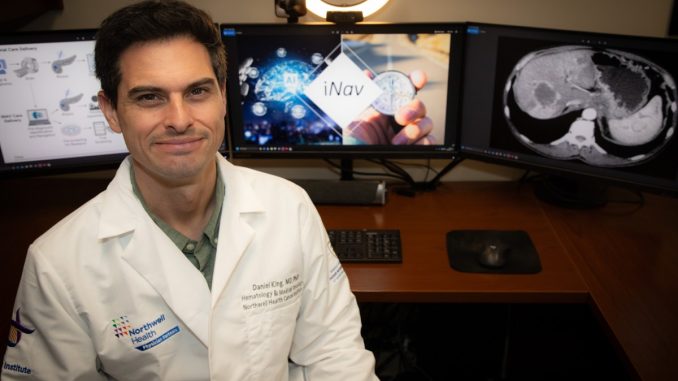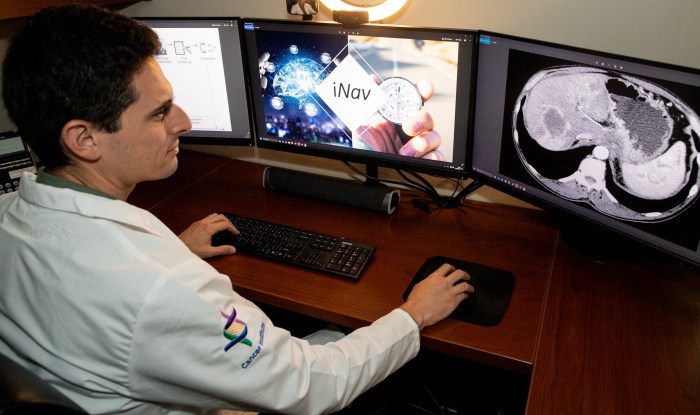
Dr. Daniel King was honored for his inveniton iNav, which surveils all scans conducted through Northwell Health to catch signs of pancreatic cancer earlier and connect patients to care (Photo courtesy of Northwell Health)
Two inventions from Northwell Health’s Feinstein Institutes for Medical Research made the list of TIME’s top 200 groundbreaking medical care inventions, one that uses artificial intelligence to screen for pancreatic cancer and the other a brain-computer interface to help restore movement and touch for those with paralysis.
iNav is an artificial intelligence technology that scans the 25,000 monthly MRI and CT scans conducted throughout the Northwell Health system for signs of pancreatic cancer. It was invented by Dr. Daniel King, Dr. Sandeep Nadella and certified registered nurse practitioner Tiffany Zavadsky over the first half of 2023.
Since it was launched, iNav reviews an average of 10,000 scans a week. It has already identified more than 100 at-risk patients and led more than 30 to critical care.
“One of the things that is special about this is it helps democratize our access to care,” King said. “We ensure that through tools like this, that no one is left behind.”
King, a Manhasset resident who grew up in Roslyn, said this technology aims to help diagnose pancreatic cancer sooner and faster. He said pancreatic cancer is one of the deadliest cancers that is often diagnosed in late stages.
The technology flags scans that detect signs of pancreatic cancer, which then alerts healthcare providers to connect those patients to resources sooner to potentially work toward a diagnosis.

King said oftentimes healthcare access is riddled with barriers, whether it be a difference in language, delays in communications or an unawareness of available resources. He said iNav works to break down those barriers and enable patients to receive the best care.
An example King provided is if a patient undergoes a scan for an unrelated issue, like a car accident, and, because other medical concerns on the mind of healthcare providers, the signs of pancreatic cancer go unnoticed. iNav would catch those.
“We don’t want anyone to fall through the cracks,” King said.
iNav has reduced the time to treatment by 50%. King said the ultimate goal, though, is to increase patients’ survivability.
King was also awarded the ASCO Foundation Conquer Cancer Career Development Award for iNav. It also received a $500,000 investment through Northwell’s Innovation Challenge.
The “Double Neural Bypass” was invented by Chad Bouton and his team of scientists, which is a brain-computer interface and neurostimulation that uses five microchips implanted into the motor and sensory portions of the brain to reconnect it to the body and spinal cord.
After a 15-hour surgery, this technology restored movement and touch to Keith Thomas, a man paralyzed from the chest down due to a 2020 spinal cord injury. Thomas now has nearly a 100% increase of his arm strength and restored sensation, sometimes even when the technology is turned off.
Last year, Thomas was able to feel the touch of his sister’s hand for the first time since his injury, feel the fur of his family dog and he can now drink on his own.
“For over two decades, my team and I have dedicated our careers to restoring function and hope to those affected by paralysis. We stand on the cusp of a breakthrough, and this recognition reinforces our belief that we can make a real difference for millions,” Bouton, said.
Bouton was awarded the Tesla Innovator of the Year in 2023. Clinical trials are ongoing for the technology to expand its use for other conditions.

